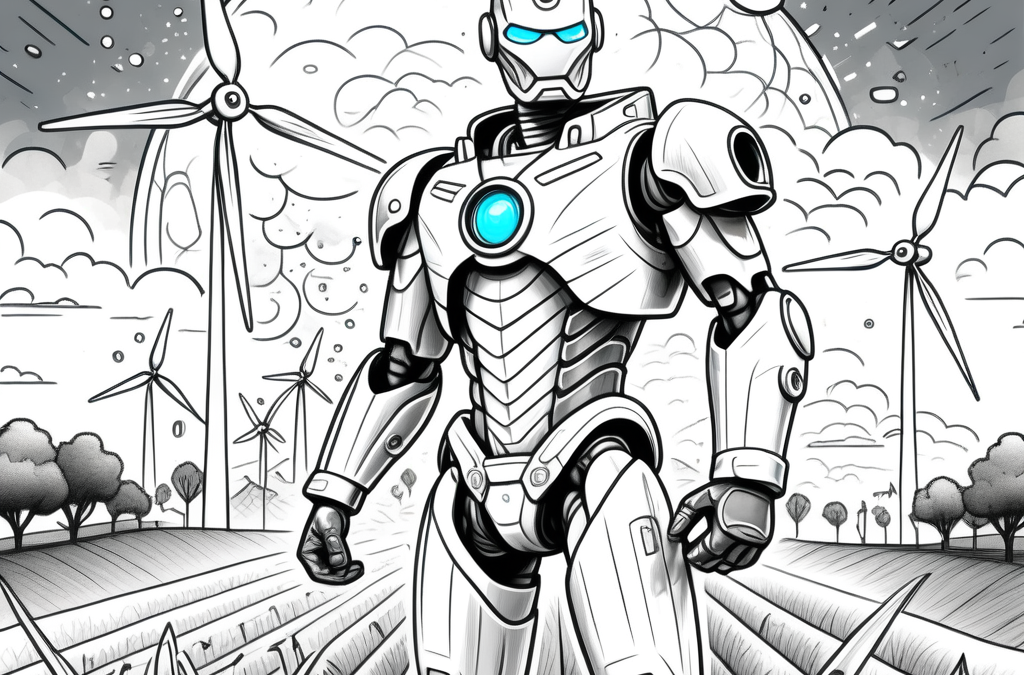The climate crisis is here, knocking on our doors with record-breaking heatwaves, fierce storms, and rising sea levels. Scientists and activists are urgently calling for action, and we can’t just sit back and watch. But here’s the thrilling part: technology is evolving rapidly, and one of the most exciting developments is Artificial Intelligence (AI). This isn’t just about futuristic robots taking over; it’s about harnessing AI’s incredible potential to tackle one of humanity’s biggest challenges—climate change. Imagine a world where AI helps us predict severe weather, optimize our energy usage, and even transform farming practices. This isn’t just a fantasy—it’s happening right now! AI acts like a data detective, revealing hidden patterns that guide us toward smarter resource management and preparedness for climate disasters.
As young tech enthusiasts and professionals, we stand on the brink of making a real impact at the intersection of technology and environmental science. Let’s explore how we can leverage AI to create a more sustainable world for ourselves and future generations!
Understanding AI: Your Smart Partner in Environmental Action
At its core, AI is a branch of computer science that teaches computers to perform tasks that usually require human-like intelligence. Here’s how AI plays a pivotal role in addressing environmental challenges:
- Data Analysis: AI can analyze vast datasets from satellite imagery and weather stations to identify trends in climate data.
- Predictive Capabilities: It can predict extreme weather events, helping communities prepare and respond more effectively.
- Resource Optimization: AI assists in managing natural resources, optimizing water usage, and improving energy consumption.
Decoding Data: How AI Analyzes Climate Complexities
Climate change presents a huge challenge filled with complicated factors like greenhouse gas emissions. AI shines in this field by:
- Spotting Trends: By processing large datasets, AI helps scientists visualize environmental trends and make informed decisions.
- Identifying Risks: It can identify regions at higher risk for climate-related disasters, allowing for better preparation and response strategies.
Resource Revolution: AI’s Impact on Sustainable Management
AI plays a crucial role in managing resources efficiently:
- Agriculture: Tools like precision farming use AI to analyze weather and soil conditions, leading to better crop yields and reduced waste.
- Waste Management: AI can predict trends in waste generation, helping cities allocate resources more efficiently and maximize recycling efforts.
Real-Time Monitoring: The AI Advantage in Climate Tracking
Keeping tabs on our planet’s health is vital, especially with climate change looming. AI enhances climate tracking by:
- Speedy Data Processing: It processes satellite data on temperatures and weather changes in real-time, enabling rapid response to environmental shifts.
- Emissions Tracking: AI identifies which sectors contribute most to greenhouse gas emissions, facilitating targeted reduction strategies.
- Ecosystem Monitoring: It provides insights into how climate change affects biodiversity, aiding conservation efforts.
Climate Change Adaptation: AI-Driven Solutions for Resilience
Smart adaptation strategies are crucial for facing climate change. AI assists in this area by:
- Vulnerability Assessment: Analyzing historical climate data to pinpoint regions vulnerable to extreme weather events.
- Ecosystem Protection: Monitoring wildlife and habitat changes, enabling targeted conservation actions.
- Infrastructure Planning: Guiding urban planners in creating resilient systems against climate disruptions.
Success Stories: AI in Action
AI is making impressive strides in combating climate change, as shown by these success stories:
- IBM’s Green Horizon: This initiative uses AI to optimize power usage in cities like Beijing, significantly reducing carbon emissions and improving air quality.
- Google’s DeepMind: By applying AI to data center operations, energy consumption for cooling systems was reduced by 40%, substantially lowering carbon footprints.
- Climate Corporation: This startup leverages AI to provide farmers with data-driven advice, increasing productivity by 20% while minimizing environmental impact.
Overcoming Challenges: The Road Ahead
While AI presents exciting opportunities, it also comes with challenges:
- Ethical Implications: Concerns regarding data privacy and algorithmic bias need to be addressed to maintain trust in AI technologies.
- Need for Collaboration: Tech companies and environmental scientists must work together to create impactful solutions.
- Scalability Issues: Scaling successful AI applications globally requires significant investments and infrastructure development.
Join the Movement: Your Role in the Future
Getting involved with AI technologies empowers you to contribute to innovative efforts while positioning you as a crucial player in the global fight for a healthier environment. Here’s how you can make a difference:
- Advocate for AI initiatives in your community.
- Participate in local sustainability projects.
- Learn coding skills to help develop AI solutions.
Defeating climate change involves more than just technology; it’s about building a community dedicated to a greener future. Let’s harness AI as an essential resource and inspire others to join this important movement. Together, we can innovate, educate, and take decisive steps toward a thriving planet for generations to come.


